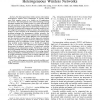Free Online Productivity Tools
i2Speak
i2Symbol
i2OCR
iTex2Img
iWeb2Print
iWeb2Shot
i2Type
iPdf2Split
iPdf2Merge
i2Bopomofo
i2Arabic
i2Style
i2Image
i2PDF
iLatex2Rtf
Sci2ools
151
click to vote
TMC
2008
2008
Mobility Modeling and Performance Evaluation of Heterogeneous Wireless Networks
The future-generation wireless systems will combine heterogeneous wireless access technologies to provide mobile users with seamless access to a diverse set of applications and services. The heterogeneity in this inter-technology roaming paradigm magnifies the mobility impact on system performance and user perceived service quality, necessitating novel mobility modeling and analysis approaches for performance evaluation. In this paper, we present and compare three mobility models in twotier integrated heterogeneous wireless systems, the independence model as a naive extension of the traditional cell residence time modeling techniques for homogeneous cellular networks, the basic Coxian model which takes into consideration the correlation between the residence time within different access technologies, and the extended-Coxian model for further improved estimation accuracy. We propose a general stochastic performance analysis framework based on application session models derived from thes...
Related Content
| Added | 15 Dec 2010 |
| Updated | 15 Dec 2010 |
| Type | Journal |
| Year | 2008 |
| Where | TMC |
| Authors | Ahmed H. Zahran, Ben Liang, Aladdin Saleh |
Comments (0)

